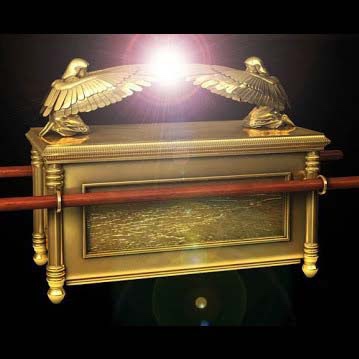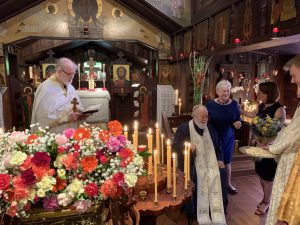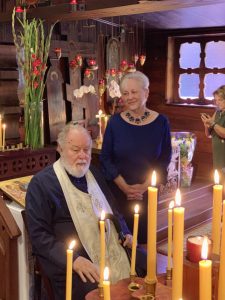Photo Gallery
-
Posts Archive
-
Links
HAPPY 50TH ANNIVERSARY, FR. LEONID AND MIMI!!!
Posted in Celebrations
Comments Off on HAPPY 50TH ANNIVERSARY, FR. LEONID AND MIMI!!!
The Orthodox Faith – Salvation History (8B)
In the Gospels we read that Christ dying on the cross he said “My God, my God, why hast thou forsaken me,” Sometimes people think that these are just words reflecting Christ’s sense of abandonment. Some even say that Jesus had lost his faith in his Father. But this is not true. On the one hand Jesus Christ is a genuine human being. Because of this He truly experienced the horrific pain of dying on the cross. On the other hand, He is the Son of God. Because of this He would never lose faith in his loving Father, with whom He is always in contact. However, these words are the beginning of Psalm 22 expressing a deeper meaning. When we read Psalm 22, verses 1-22 we see how well these verses apply to Christ. There is something else which we should understand. To the Jewish way of thinking, when one begins to read a psalm the intention is to finish it even if one could not finish it. So Christ’s beginning words about being forsaken implies the last verses about God’s victory. It is important to read this whole psalm, but to make the argument clear let us look at a few verses from Psalm 22:
Verse 1 – This reflects Christ’s suffering
Verse 18 – The soldiers gamble to win Christ’s garment
Verses 26-28 – This speaks about God’s and hence, Christ’s ultimate victory
But we read further in the Psalm we see that it’s not a cry of utter despair, but rather of a prayer in praise of God (22:22-31)
My God, my God, why hast thou forsaken me? Why art thou so far from helping me, from the words of my groaning? [2] O my God, I cry by day, but thou dost not answer; and by night, but find no rest. [3] Yet thou art holy, enthroned on the praises of Israel. [4] In thee our fathers trusted; they trusted, and thou didst deliver them. [5] To thee they cried, and were saved; in thee they trusted, and were not disappointed. [6] But I am a worm, and no man; scorned by men, and despised by the people. [7] All who see me mock at me, they make mouths at me, they wag their heads; [8] “He committed his cause to the Lord; let him deliver him, let him rescue him, for he delights in him!” [9] Yet thou art he who took me from the womb; thou didst keep me safe upon my mother’s breasts. [10] Upon thee was I cast from my birth, and since my mother bore me thou hast been my God. [11] Be not far from me, for trouble is near and there is none to help. [12] Many bulls encompass me, strong bulls of Bashan surround me; [13] they open wide their mouths at me, like a ravening and roaring lion. [14] I am poured out like water, and all my bones are out of joint; my heart is like wax, it is melted within my breast; [15] my strength is dried up like a potsherd, and my tongue cleaves to my jaws; thou dost lay me in the dust of death. [16] Yea, dogs are round about me; a company of evildoers encircle me; they have pierced my hands and feet — [17] I can count all my bones — they stare and gloat over me; [18] they divide my garments among them, and for my raiment they cast lots. [19] But thou, O Lord, be not far off! O thou my help, hasten to my aid! [20] Deliver my soul from the sword, my life from the power of the dog! [21] Save me from the mouth of the lion, my afflicted soul from the horns of the wild oxen! [22] I will tell of thy name to my brethren; in the midst of the congregation I will praise thee: [23] You who fear the Lord, praise him! all you sons of Jacob, glorify him, and stand in awe of him, all you sons of Israel! [24] For he has not despised or abhorred the affliction of the afflicted; and he has not hid his face from him, but has heard, when he cried to him. [25] From thee comes my praise in the great congregation; my vows I will pay before those who fear him. [26] The afflicted shall eat and be satisfied; those who seek him shall praise the Lord! May your hearts live forever! [27] All the ends of the earth shall remember and turn to the Lord; and all the families of the nations shall worship before him.
[28] For dominion belongs to the Lord, and he rules over the nations. [29] Yea, to him shall all the proud of the earth bow down; before him shall bow all who go down to the dust, and he who cannot keep himself alive. [30] Posterity shall serve him; men shall tell of the Lord to the coming generation, [31] and proclaim his deliverance to a people yet unborn, that he has wrought it. (Psalm 22)
In other words, this Old Testament psalm clearly points to Christ’s suffering on the cross, but also to his victory. Of course, when Jewish people read these and other similar passages, they do not think of it as applying to the Messiah. For them the idea that the Messiah suffered would be repugnant. It is only when we read the Old Testament with Christian eyes that we see the true meaning.
In fact, this is one reason to believe the resurrection accounts are true. The apostles were all Jews, so they would never think of the Messiah dying on the cross. If one asks a contemporary Jew about this, he would say the same thing.
But others say that the pagans, the Romans, Greeks, Egyptians had the idea of a dying and rising god. But when we look at their myths more closely, they were usually about a god who died in the winter and rose in the spring. They did not consider these gods to be recently dead men, but rather they believed this was all done in some mystical time. They would never think that their rising and dying god was a recently executed Jewish criminal. In addition, their god never became truly human, that their god was born, lived, died, arose again in genuine human being. For the pagans the human body was something vile, to be escaped from. For pagans, life as an immortal resurrection body would be a kind of hell. But God indeed became an embodies human being in order to raise all embodies humans with him for eternal glory.
Fr. John
Posted in Church Services, Sermons
Comments Off on The Orthodox Faith – Salvation History (8B)
The Orthodox Faith – Salvation History (8A)
Many people are interested in prophecy. They want to know their own future and the future of the whole world, so they go to fortune tellers, psychics, card readers, etc. But the Bible forbids us to go to such people.
“You shall not eat any flesh with the blood in it. You shall not practice augury or witchcraft. (Lev 19:26)
“Do not turn to mediums or wizards; do not seek them out, to be defiled by them: I am the Lord your God. (Lev 19:31)
And when they say to you, “Consult the mediums and the wizards who chirp and mutter,” should not a people consult their God? Should they consult the dead on behalf of the living? (Is 8:119)
Consulting psychics, astrologers, etc. shows a lack of trust in God. Our fate, so to speak, is in the hands of a loving God. This is all we need to know.
One perennial curiosity is who or what is the Antichrist. This figure appears in many parts of the New Testament. His coming heralds the end times in which Christ will come again, destroy the Antichrist and establish His kingdom. Throughout Christian history people looked at the Bible to find out when the second coming will be. Even the Apostles wanted to know this. But we see how Christ responds to the question about the end of the world.
So when they had come together, they asked him, “Lord, will you at this time restore the kingdom to Israel?” He said to them, “It is not for you to know times or seasons which the Father has fixed by his own authority. (Acts 1:6-7)
Christ then ascends into heaven. But Christ’s answer has never satisfied people’s curiosity about the end and so many people have used the Bible, especially the Book of Daniel, in the Old Testament and the Book of Revelation in the New Testament, to identify the Antichrist and determine when Christ will come again.
Throughout Christian history many evil rulers have been called the Antichrist: Emperor Nero, Emperor Diocletian, Genghis Khan, Atilla the Hun, Hitler, Stalin and many others. But Christ’s response to the Apostles question shows us that we will never know the date of the Second Coming. To show how foolish this kind of curiosity is the writer of this article refers to a book he was shown as a seminarian. It was an old book printed early in the nineteenth century “proving” that Napoleon was the Antichrist and the Second Coming was imminent. The author of this book searched the Bible for verses which seem to refer to Napoleon. For us, this may seem silly. We know that Napoleon was not the Antichrist. The point here is that the Bible is not a fortune telling book. But none of this is prophecy in the Biblical sense.
Of course, the Old Testament prophets pointed forward to the coming of the Messiah. Some of the prophecies were uncannily close to what actually occurred. For example the book of Isaiah has some hymns or songs about the Suffering Servant. Jews would not think that these verses about suffering could be applied to the Messiah. For them a suffering Messiah is a contradiction in terms. For them the Messiah was a victorious king so to speak. Some Jews think that these words apply to the state of Israel. In other words, the suffering servant texts refer to the Jewish people, over the centuries. Out of this suffering came the nation of Israel.. But we see how these words apply to Jesus Christ.
Who has believed what we have heard? And to whom has the arm of the Lord been revealed? For he grew up before him like a young plant, and like a root out of dry ground;
he had no form or comeliness that we should look at him, and no beauty that we should desire him. He was despised and rejected by men; a man of sorrows, and acquainted with grief; and as one from whom men hide their faces he was despised, and we esteemed him not. Surely he has borne our griefs and carried our sorrows; yet we esteemed him stricken,
smitten by God, and afflicted. But he was wounded for our transgressions, he was bruised for our iniquities; upon him was the chastisement that made us whole, and with his stripes we are healed. All we like sheep have gone astray; we have turned everyone to his own way;
and the Lord has laid on him the iniquity of us all. He was oppressed, and he was afflicted,
yet he opened not his mouth; like a lamb that is led to the slaughter, and like a sheep that before its shearers is dumb, so he opened not his mouth. By oppression and judgment he was taken away; and as for his generation, who considered that he was cut off out of the land of the living, stricken for the transgression of my people? And they made his grave with the wicked and with a rich man in his death, although he had done no violence, and there was no deceit in his mouth. Yet it was the will of the Lord to bruise him; he has put him to grief;
when he makes himself an offering for sin, he shall see his offspring, he shall prolong his days; the will of the Lord shall prosper in his hand; he shall see the fruit of the travail of his soul and be satisfied; by his knowledge shall the righteous one, my servant, make many to be accounted righteous; and he shall bear their iniquities. Therefore I will divide him a portion with the great, and he shall divide the spoil with the strong; because he poured out his soul to death, and was numbered with the transgressors; yet he bore the sin of many, and made intercession for the transgressors. (Isaiah 53)
This is just an example. In the Book of Isaiah there are many other servant songs which we, as Christians, understand as applying to Jesus.
Fr. John
Posted in Church Services, Sermons
Comments Off on The Orthodox Faith – Salvation History (8A)
The Orthodox Faith – Salvation History (7)
As we have seen earlier, sacrifice is an important aspect of religion. Throughout the history of humanity sacrifice is found in many religions, in many places in the world. Sacrifice comes naturally to human beings to the point that live human sacrifice was practiced. The idea is that we offer something valuable to God. In the Old Testament and in the beginning of the New Testament, parents had to offer a sacrifice for their first born son. Because Mary and Joseph were poor, they could only afford to offer two turtledoves rather than sheep or goats.
“And when the time came for their purification according to the law of Moses, they brought him up to Jerusalem to present him to the Lord (as it is written in the law of the Lord, “Every male that opens the womb shall be called holy to the Lord”) and to offer a sacrifice according to what is said in the law of the Lord, “a pair of turtledoves, or two young pigeons.”(Luke 2:21-23)
We may want to say that we are sorry to God or to ask God to heal our illnesses or to protect our country from attack or many other reasons.
All of this is true. When we read the Old Testament, we see precise details about how to perform sacrifice for different reasons and so on. The Old Testament sacrifice was ordered by God, but the sacrifice of sheep or goats could only have a limited efficacy. Something more was needed and that something was Jesus Christ.
In the New Testament, especially in the Letter to the Hebrews, the author tells us the many different ways Christ is the true sacrifice. Here are some quotes.
But when Christ appeared as a high priest of the good things that have come, then through the greater and more perfect tent (not made with hands, that is, not of this creation) he entered once for all into the Holy Place, taking not the blood of goats and calves but his own blood, thus securing an eternal redemption. For if the sprinkling of defiled persons with the blood of goats and bulls and with the ashes of a heifer sanctifies for the purification of the flesh, how much more shall the blood of Christ, who through the eternal Spirit offered himself without blemish to God, purify your conscience from dead works to serve the living God. (Heb 9:11-14)
For Christ has entered, not into a sanctuary made with hands, a copy of the true one, but into heaven itself, now to appear in the presence of God on our behalf. Nor was it to offer himself repeatedly, as the high priest enters the Holy Place yearly with blood not his own; for then he would have had to suffer repeatedly since the foundation of the world. But as it is, he has appeared once for all at the end of the age to put away sin by the sacrifice of himself. And just as it is appointed for men to die once, and after that comes judgment, so Christ, having been offered once to bear the sins of many, will appear a second time, not to deal with sin but to save those who are eagerly waiting for him. (Heb 9:24-28)
Christ is the perfect priest and the perfect sacrifice. Christ is the offering and the offered. As the priest prays in the Divine Liturgy “Thou (i.e., Christ) didst become man, yet without change or alteration and as Ruler of All didst commit to us this liturgical and bloodless sacrifice. … For Thou art the offering and the offered, the Receiver and the Received.”
The idea here is that Jesus Christ is acting through our offering of bread and wine which will become the Body and Blood of Jesus Christ. Christ offers, Christ receives. So we see that Jesus Christ is the one perfect sacrifice fulfilling all the sacrifices of the Old Testament and indeed, of all sacrifices no matter wherever they are found. Sins are forgiven, and humanity attains union with God.
Fr. John
Posted in Church Services, Sermons
Comments Off on The Orthodox Faith – Salvation History (7)
The Orthodox Faith – Salvation History (6c)
As noted earlier the Temple of Jerusalem was destroyed by the Romans. Now, Christians themselves are the Temple.
 ‘But now in Christ Jesus you who once were far off have been brought near in the blood of Christ. For he is our peace, who has made us both one, and has broken down the dividing wall of hostility, by abolishing in his flesh the law of commandments and ordinances, that he might create in himself one new man in place of the two, so making peace, and might reconcile us both to God in one body through the cross, thereby bringing the hostility to an end. And he came and preached peace to you who were far off and peace to those who were near; for through him we both have access in one Spirit to the Father. So then you are no longer strangers and sojourners, but you are fellow citizens with the saints and members of the household of God, built upon the foundation of the apostles and prophets, Christ Jesus himself being the cornerstone, in whom the whole structure is joined together and grows into a holy temple in the Lord; in whom you also are built into it for a dwelling place of God in the Spirit.” (Eph 2:13-22)
‘But now in Christ Jesus you who once were far off have been brought near in the blood of Christ. For he is our peace, who has made us both one, and has broken down the dividing wall of hostility, by abolishing in his flesh the law of commandments and ordinances, that he might create in himself one new man in place of the two, so making peace, and might reconcile us both to God in one body through the cross, thereby bringing the hostility to an end. And he came and preached peace to you who were far off and peace to those who were near; for through him we both have access in one Spirit to the Father. So then you are no longer strangers and sojourners, but you are fellow citizens with the saints and members of the household of God, built upon the foundation of the apostles and prophets, Christ Jesus himself being the cornerstone, in whom the whole structure is joined together and grows into a holy temple in the Lord; in whom you also are built into it for a dwelling place of God in the Spirit.” (Eph 2:13-22)
“Do you not know that you are God’s temple and that God’s Spirit dwells in you? If any one destroys God’s temple, God will destroy him. For God’s temple is holy, and that temple you are..” (I Cor 3:16-17)
“Come to him, to that living stone, rejected by men but in God’s sight chosen and precious; and like living stones be yourselves built into a spiritual house, to be a holy priesthood, to offer spiritual sacrifices acceptable to God through Jesus Christ. For it stands in scripture: “Behold, I am laying in Zion a stone, a cornerstone chosen and precious, and he who believes in him will not be put to shame.” (I Pet 2:4-6)
The point of all of this is clear. The Temple in Jerusalem was the presence of God on earth. For Jews, there was nothing as holy as this. So, when Jesus identifies His body with the Temple and claims authority over it, He is telling us that He Himself is that locus of Holiness, both in this world and the next. And we ourselves as baptized Christians are ourselves become temples of the Lord. We may fail to live up to this standard, but we do indeed partake of God’s holiness. And, of course, there will be no temple in heaven. The Book of Revelation, the last book of the Bible describes heaven in this way:
“I saw a new heaven and a new earth; for the first heaven and the first earth had passed away, and the sea was no more. And I saw the holy city, new Jerusalem, coming down out of heaven from God, prepared as a bride adorned for her husband; and I heard a loud voice from the throne saying, “Behold, the dwelling of God is with men. He will dwell with them, and they shall be his people, and God himself will be with them; … And I saw no temple in the city, for its temple is the Lord God the Almighty and the Lamb. And the city has no need of sun or moon to shine upon it, for the glory of God is its light, and its lamp is the Lamb. By its light shall the nations walk; and the kings of the earth shall bring their glory into it, and its gates shall never be shut by day — and there shall be no night there; they shall bring into it the glory and the honor of the nations. But nothing unclean shall enter it, nor anyone who practices abomination or falsehood, but only those who are written in the Lamb’s book of life. (Rev 21: 1-3, 22-27)
 It seems that the Ark of the Covenant was taken from the Temple when the Babylonians sacked the Temple in 585 BC. It’s location now is a matter of conjecture.
It seems that the Ark of the Covenant was taken from the Temple when the Babylonians sacked the Temple in 585 BC. It’s location now is a matter of conjecture.
Some Jewish sources suggest that the Ark was hidden in caves beneath the Temple when the Babylonians were attacking the Temple. On the other hand, there is a strong, ancient tradition in the Ethiopian Orthodox Church that they possess the Ark of the Covenant. Other sources suggest it was in Rome or someplace else in Europe. Even now people search for the Ark. But this is difficult. Because of the political situation in Jerusalem, excavation beneath the Temple Mount is restricted. Also, the Ethiopian Orthodox Church while claiming that it has the Ark refuses to show it to the world. As far as Rome goes, Rome itself was sacked by the barbarians, so what happened to the Ark after this?
The Ark also occurs in secular culture. We may remember the 1980 movie “Raiders of the Lost Ark.” The search for the Ark is the theme of this movie. In general, we see many instances in popular culture from movies, books, video games, etc. But we should never forget that the Ark is a holy Jewish and Christian relic. It does not have magical powers but is a reminder of God’s covenant and presence with humanity.
Fr. John
Posted in Church Services, Sermons
Comments Off on The Orthodox Faith – Salvation History (6c)





